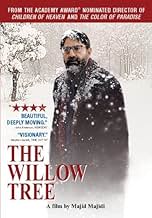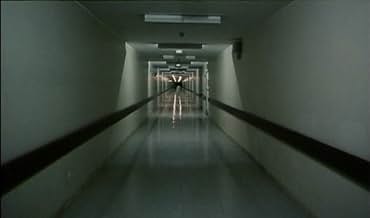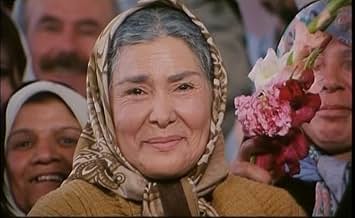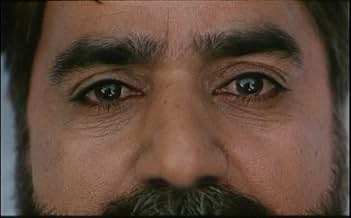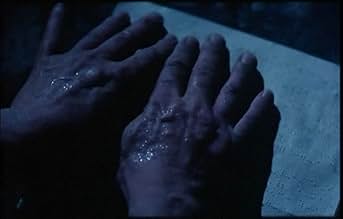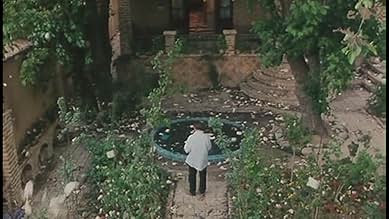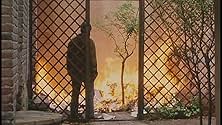IMDb RATING
7.3/10
4.6K
YOUR RATING
Youssef, a blind university professor, is suddenly diagnosed with a fatal disease and must undergo treatment in France. Back home, will he find the life he had before?Youssef, a blind university professor, is suddenly diagnosed with a fatal disease and must undergo treatment in France. Back home, will he find the life he had before?Youssef, a blind university professor, is suddenly diagnosed with a fatal disease and must undergo treatment in France. Back home, will he find the life he had before?
- Awards
- 2 wins & 2 nominations total
Soghra Obeisi
- Aziz
- (as Afarin Obeisi)
Leila Otadi
- Pari
- (as Leila Outadi)
Featured reviews
I saw this at the 2005 TIFF to a packed audience.
This was an eye-opening movie in a couple ways.
Not only is this drama about a blind Iranian man who unexpectedly comes upon sight during a routine eye operation in Paris, but it opened my eyes to the value of sight in life.
The main character in this movie has been living life without sight for 38 years, so much so that we see the habits, the challenges, the braille reading, and the support his friends and family give him and which he is subtly dependent upon. Yet when this miraculous chance to see gives him, shall we say, a second chance, what does he do with it? In fact what would anyone do with it? What I liked most about this was that the challenge posed to the lead character and the choices he made were so very real with the challenges and dilemma of his choices and frustration clear. This made me consider the choices *I* have been making in life. If I were given a second chance with anything, what would *I* do with it? This was a thought-provoking movie that took me into a world I have never experienced. And while I have seen movies about blind people, this movie really seemed to capture the view of life from this particular blind man: his challenges; his decisions; and most importantly, his emotional state.
This is a smart and very real movie that was moving, thought-provoking. Visually speaking, the weaving of light with dark scenes allows the story to further come to life giving a final illumination on a story that shares, sympathizes and delivers.
This is a well-done piece of work! Congratulations!
This was an eye-opening movie in a couple ways.
Not only is this drama about a blind Iranian man who unexpectedly comes upon sight during a routine eye operation in Paris, but it opened my eyes to the value of sight in life.
The main character in this movie has been living life without sight for 38 years, so much so that we see the habits, the challenges, the braille reading, and the support his friends and family give him and which he is subtly dependent upon. Yet when this miraculous chance to see gives him, shall we say, a second chance, what does he do with it? In fact what would anyone do with it? What I liked most about this was that the challenge posed to the lead character and the choices he made were so very real with the challenges and dilemma of his choices and frustration clear. This made me consider the choices *I* have been making in life. If I were given a second chance with anything, what would *I* do with it? This was a thought-provoking movie that took me into a world I have never experienced. And while I have seen movies about blind people, this movie really seemed to capture the view of life from this particular blind man: his challenges; his decisions; and most importantly, his emotional state.
This is a smart and very real movie that was moving, thought-provoking. Visually speaking, the weaving of light with dark scenes allows the story to further come to life giving a final illumination on a story that shares, sympathizes and delivers.
This is a well-done piece of work! Congratulations!
I have been deeply moved by "The Willow Tree," which I saw this evening as part of an Iranian film series at the Freer Gallery in Washington DC. I am not sure that any Western culture could ever produce something as beautiful, but I hope all westerners see it. It has impressed positively and permanently. I was most moved by the scene of the hero coming back to Iran, and seeing his mother, and then again, when the mother comes to his house after his wife has left. The most beautiful, was our hero looking for the papers in the pond, and finding that special one. The ending is magnificent, as it allows us to ponder which is better, to continue blind, or be blessed again with sight. But in either case he seems condemned. Thank you. James
In the lyrical and touching Iranian drama "The Willow Tree," a middle-aged college professor, blind since the age of eight, regains his sight after undergoing a cornea transplant.
Through the years, Yusef has learned to function in a world of darkness. He even long ago stopped blaming God for his condition (he went blind while playing with firecrackers as a boy). Having made his peace with his situation, Yusef is now suddenly confronted with the unforeseen mixed blessing of regaining his sight. On the one hand, he yearns to be able to once again behold the vast and myriad beauties of the visual world; on the other, he risks losing the sense of security and comfort that comes from living in a world that is real and familiar to him.
Director Majid Majidi captures some of the visual sensory overload Yusef experiences when he is once again reunited with the sighted world, which includes seeing his wife and young daughter for the first time. And how will the change in his condition affect the couple's relationship - the roles each of them plays within that relationship, and the ways in which they interact with one another? For now that he is no longer dependent on others to get around and is free to do things on his own, Yusef begins to press against the tightly-bound parameters of his heavily circumscribed life, falling for a beautiful young student in one of his classes and becoming less willing to play the part of the uncomplaining, long-suffering victim to please his wife and mother who have found their own purpose and meaning in taking care of him all these years. Then Fate plays a cruel trick on him, making him realize that he can never be fully happy in either state of sightedness (Majidi doesn't cater to his audience's desire for an uplifting, happy ending).
To emphasize the way in which Yousef experiences the world, the movie features a hyper-sensitive soundtrack filled with the amplified sounds of birds chirping, water gurgling, leaves rustling, raindrops falling, etc. The only real disappointment is the musical score, which is often lugubrious, soupy and overly-emphatic.
Much of "The Willow Trees"'s success can be attributed to Parviz Parastui's subtle and wide-ranging performance in the lead role. As Yusef, Parastui runs the gamut from submissive introvert to railing despondent without hitting a single false note at either end.
Through the years, Yusef has learned to function in a world of darkness. He even long ago stopped blaming God for his condition (he went blind while playing with firecrackers as a boy). Having made his peace with his situation, Yusef is now suddenly confronted with the unforeseen mixed blessing of regaining his sight. On the one hand, he yearns to be able to once again behold the vast and myriad beauties of the visual world; on the other, he risks losing the sense of security and comfort that comes from living in a world that is real and familiar to him.
Director Majid Majidi captures some of the visual sensory overload Yusef experiences when he is once again reunited with the sighted world, which includes seeing his wife and young daughter for the first time. And how will the change in his condition affect the couple's relationship - the roles each of them plays within that relationship, and the ways in which they interact with one another? For now that he is no longer dependent on others to get around and is free to do things on his own, Yusef begins to press against the tightly-bound parameters of his heavily circumscribed life, falling for a beautiful young student in one of his classes and becoming less willing to play the part of the uncomplaining, long-suffering victim to please his wife and mother who have found their own purpose and meaning in taking care of him all these years. Then Fate plays a cruel trick on him, making him realize that he can never be fully happy in either state of sightedness (Majidi doesn't cater to his audience's desire for an uplifting, happy ending).
To emphasize the way in which Yousef experiences the world, the movie features a hyper-sensitive soundtrack filled with the amplified sounds of birds chirping, water gurgling, leaves rustling, raindrops falling, etc. The only real disappointment is the musical score, which is often lugubrious, soupy and overly-emphatic.
Much of "The Willow Trees"'s success can be attributed to Parviz Parastui's subtle and wide-ranging performance in the lead role. As Yusef, Parastui runs the gamut from submissive introvert to railing despondent without hitting a single false note at either end.
A very good movie. The actors and the director have done an awesome job. The photography is pure poetry. The places and the locations are very evocative. The story is very deep. It makes you see the world with totally different eyes. A simple plot of a blind man regaining his sight is turned into into a masterpiece of emotions. Some scenes in the movie are really powerful and are there to stay within you, deep inside. Yusef the hero of the film is a strong character. Depite his blindness, as a professor he has done a lot and won the respect and the hearts of the people. But when he gets his sights back the world around him is totally different and he struggles even more. He is not able to cope with what he sees and his image of his wife and the family and his mother all confuse him. He finds his friends wife attractive and becomes obsessed with meeting her and hearing her voice etc. The scenes depicting Yusef's desires and the confusion are a marvel in direction and acting. There are some over dramatic elements in this movie that could have been avoided but even those scenes have a point in touching the viewer a bit deep and making the point. All in All a superb film. Makes one wonder
Sometimes God works in mysterious ways, and us mortal man have absolutely no idea what to make of it, opting for the most parts to blame the big guy when things don't go our way, only to find out that the fault lies in ourselves. No, I'm not suddenly pious and wanting to spread the word, but Majid Majidi's The Willow Tree evoked such a feeling and reminder to myself, that it's always so easy to blame "somebody else", even though that someone could be the guy up there.
I haven't seen much of Majid Majidi's works, but from what I have in just Children of Heaven, and now The Willow Tree, I can't wait to watch a whole lot more. The stories might seem simple - few key characters (lovable too I might add), gorgeously shot, and you might think you have the plot all wrapped up, there's always this beauty in the simplicity of it all, and its powerful underlying message ever so subtle, in no way sledge-hammering itself on you at all. Somehow I feel that there's so much enveloping the movie, that I'm simply amazed at how they are all packaged together in a nicely paced movie, without the need to be butt- numbing.
Youssef (Parviz Parastui) is a blind university professor, who spends his time playing with his young daughter, and has his wife assist him with his work. From the onset, it's a happy little family, except that Youssef has a dream, that he could one day regain his sight and see again. Sometimes I wonder if able folks like us take things for granted naturally, and if only we lose it, do we start appreciating and missing something at all. Majid has for the first minute placed us in Youssef's shoes, and listening to his innermost thoughts and dreams, one ponders.
While faith is important, and I would think if I were in Youssef's shoes, I would also choose to turn to religion as a pillar of strength, there's this little warning of being careful with what you wish for, as sometimes, what you think is best for yourself, isn't true at all. If you made promises to the big man, make sure you can fulfill those promises, and not let it ring empty. We follow Youssef's journey and understand his fears, frustrations and hopes, coupled with his fall from grace and redemption. The Willow Tree leaves things wide open, but you can only hope for the best. I like the way how Youssef is forced to choose, and I actually felt pity for the guy as he loses himself, like the saying goes, because of his straying eye. I wonder too, if our gift of sight somehow will sometimes be the attributing factor, or seed the beginnings of mistrust, just because our eye sees something that our minds interpret differently, or fantasize.
And the movie couldn't work without the excellent soundtrack, or the commanding performance by the lead Parviz Parastui. He has one one hand made Youssef a likable fellow, yet managed in the same movie to make us despise his actions, with a tinge of pity, and at times, just wanting to slap him out of his arrogance. It's been a long while since I actually cared for a character, and want to reach out to him - as the bystanders usually have the better view of any situation - and to direct him, just as how you would a blind person, to avoid the pitfalls that seem set to dawn on him.
At another level, The Willow Tree has indeed opened my eyes to more of Iran, instead of those ra-ra sanctions filled news bulletins demonizing the country as a whole. I thought that through film, I see a little more of a country caught on celluloid, depicting the same hopes, dreams, and even challenges that folks in the country grapple with too. And with such intelligent stories from their filmmakers, you wonder about their rich culture, and also realize that you don't need big sets and big moments to create an impact - the little things in life that you can put into stories to tell, work just as majestically.
I haven't seen much of Majid Majidi's works, but from what I have in just Children of Heaven, and now The Willow Tree, I can't wait to watch a whole lot more. The stories might seem simple - few key characters (lovable too I might add), gorgeously shot, and you might think you have the plot all wrapped up, there's always this beauty in the simplicity of it all, and its powerful underlying message ever so subtle, in no way sledge-hammering itself on you at all. Somehow I feel that there's so much enveloping the movie, that I'm simply amazed at how they are all packaged together in a nicely paced movie, without the need to be butt- numbing.
Youssef (Parviz Parastui) is a blind university professor, who spends his time playing with his young daughter, and has his wife assist him with his work. From the onset, it's a happy little family, except that Youssef has a dream, that he could one day regain his sight and see again. Sometimes I wonder if able folks like us take things for granted naturally, and if only we lose it, do we start appreciating and missing something at all. Majid has for the first minute placed us in Youssef's shoes, and listening to his innermost thoughts and dreams, one ponders.
While faith is important, and I would think if I were in Youssef's shoes, I would also choose to turn to religion as a pillar of strength, there's this little warning of being careful with what you wish for, as sometimes, what you think is best for yourself, isn't true at all. If you made promises to the big man, make sure you can fulfill those promises, and not let it ring empty. We follow Youssef's journey and understand his fears, frustrations and hopes, coupled with his fall from grace and redemption. The Willow Tree leaves things wide open, but you can only hope for the best. I like the way how Youssef is forced to choose, and I actually felt pity for the guy as he loses himself, like the saying goes, because of his straying eye. I wonder too, if our gift of sight somehow will sometimes be the attributing factor, or seed the beginnings of mistrust, just because our eye sees something that our minds interpret differently, or fantasize.
And the movie couldn't work without the excellent soundtrack, or the commanding performance by the lead Parviz Parastui. He has one one hand made Youssef a likable fellow, yet managed in the same movie to make us despise his actions, with a tinge of pity, and at times, just wanting to slap him out of his arrogance. It's been a long while since I actually cared for a character, and want to reach out to him - as the bystanders usually have the better view of any situation - and to direct him, just as how you would a blind person, to avoid the pitfalls that seem set to dawn on him.
At another level, The Willow Tree has indeed opened my eyes to more of Iran, instead of those ra-ra sanctions filled news bulletins demonizing the country as a whole. I thought that through film, I see a little more of a country caught on celluloid, depicting the same hopes, dreams, and even challenges that folks in the country grapple with too. And with such intelligent stories from their filmmakers, you wonder about their rich culture, and also realize that you don't need big sets and big moments to create an impact - the little things in life that you can put into stories to tell, work just as majestically.
Details
Box office
- Gross US & Canada
- $25,752
- Opening weekend US & Canada
- $6,048
- Aug 5, 2007
- Gross worldwide
- $51,499
- Runtime1 hour 36 minutes
- Color
- Sound mix
- Aspect ratio
- 1.85 : 1
Contribute to this page
Suggest an edit or add missing content


